Ramadasu could refer to:
- Bhadrachala Ramadasu, 17th century Indian composer and poet
- Ramadasu, a 1934 film produced by East India Film company
- Ramadasu, a 1934 film produced by Krishna Films
- Ramadasu, a 1964 film
- Sri Ramadasu , a 2006 film
Ramadasu could refer to:
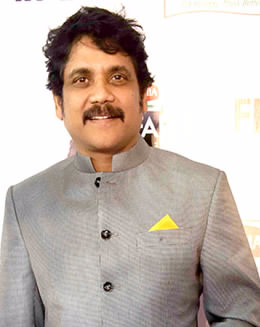
Akkineni Nagarjuna Rao, known mononymously as Nagarjuna, is an Indian actor and film producer who works predominantly in Telugu, Hindi and Tamil films. One of the highest paid South Indian actor, Nagarjuna has appeared in over 90 films. He is a recipient of two National Film Awards for Ninne Pelladata (1996) and Annamayya (1997), ten state Nandi Awards and three Filmfare Awards South.
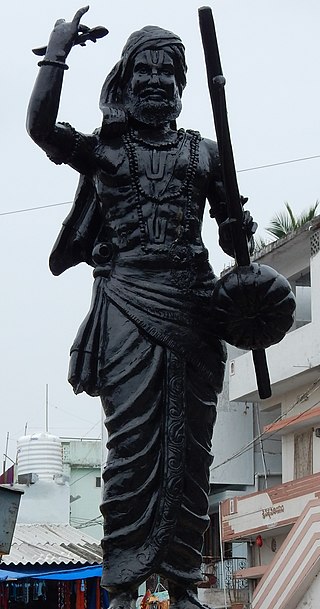
Kancharla Gopanna, popularly known as Bhakta Ramadasu or Bhadrachala Ramadasu, was a 17th-century devotee of the Hindu god Rama, a saint-poet and a composer of Carnatic music. He is a famous Vaggeyakara from the Telugu classical era. He was born in the village of Nelakondapalli in Khammam district, and orphaned as a teenager. He spent his later years in Bhadrachalam and 12 years in solitary confinement at the Golconda prison during the Qutb Shahi rule. Different mythical stories about his life circulate in the Telugu tradition. He is renowned for constructing the famous Sita Ramachandraswamy Temple and pilgrimage center on the banks of river Godavari at Bhadrachalam. His devotional kirtana lyrics to Rama illustrate the classical Pallavi, Anupallavi and Charanam genre composed mostly in Telugu, some in Sanskrit and with occasional use of Tamil language. These are famous in South Indian classical music as Ramadaasu Keertanalu.

Sri Ramadasu is 2006 Indian Telugu-language biographical film, based on the life of musician saint Kancharla Gopanna. A reboot of V. Nagayya's 1964 film Ramadasu; the film is written and directed by K. Raghavendra Rao. Produced by Konda Krishnam Raju, the film starred Akkineni Nageswara Rao and Akkineni Nagarjuna in lead roles, while the music was composed by M. M. Keeravani. Cinematography and editing were handled by S. Gopal Reddy and Sreekar Prasad respectively.

Konidela Nagendra "Naga" Babu is an Indian actor, producer, and politician who works in Telugu cinema. He has received one National Film Award and two Nandi Awards for his work as a producer. He is the current General Secretary of the Janasena Party.
S. Gopal Reddy is an Indian cinematographer, screenwriter, director and producer, known for his works in Telugu and Hindi. He is mainly known for his collaborations with Jandhyala, Ram Gopal Varma, and K. Raghavendra Rao. In 1991, he co-produced the blockbuster Kshana Kshanam, under his production house Durga Arts. He has received two Filmfare Best Cinematographer Award (South) for Varsham and Sri Ramadasu in 2004 and 2006 respectively.

Tiger is a 1979 Indian Telugu-language action film, produced by Parvathaneni Narayana Rao and directed by Nandamuri Ramesh. The film stars N. T. Rama Rao, Rajinikanth, Radha Saluja and Subhashini, with music composed by Satyam. It was also Rajinikanth's 50th film as an actor. The film is a remake of the Hindi film Khoon Pasina (1977).
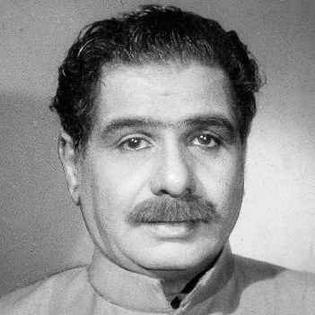
Vuppaladadiyam Nagayya Sarma, popularly known as Chittoor Nagayya, was an Indian actor, singer, music composer, and director known for his works in Telugu cinema, Tamil cinema, and Telugu theatre. Nagayya was one of the first multilingual filmmakers in India. Indian film journalist Baburao Patel described Nagayya as "The Paul Muni of India". Nagayya was considered the best character actor in South Indian cinema during 1940s and 1950s. In 1965, he became the first South Indian actor to receive the Padma Shri in Arts from the Government of India for his contributions to Indian cinema.
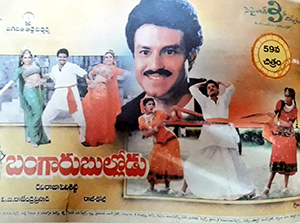
Bangaru Bullodu is a 1993 Indian Telugu-language action drama film, produced by V. B. Rajendra Prasad under the Jagapathi Art Pictures banner and directed by Ravi Raja Pinisetty. It stars Nandamuri Balakrishna, Ramya Krishna and Raveena Tandon. Raj–Koti composed the music. It marks Raveena Tandon's debut in Telugu cinema. The film released the same day as Nippu Ravva, which also starred Balakrishna. The film was a box-office hit.

Chilakalapudi Seeta Rama Anjaneyulu, popularly known as C. S. R., was an Indian method actor, and thespian best known for his works in Telugu cinema, and Telugu theater. He acted in many stage dramas and portrayed lead characters and mythological roles in over 175 movies. He was one of the lead actors of his time. Anjaneyulu was an established lead actor by the late 1930s, preceding the entrance of actors such as NTR and ANR. His performance in the super-hit Bhaktha Ramadasu in 1937 won him many accolades. In the 1950s, starting with Pathala Bhairavi screened at the first International Film Festival of India, he began acting in character roles. In Pathala Bhairavi, he plays a king worried about his daughter, a princess kidnapped by a wicked magician played by Ranga Rao.

Appu Chesi Pappu Koodu is a 1959 Indian Telugu-language comedy drama film directed and co-written by L. V. Prasad. The film was produced by Nagi Reddi and Chakrapani of Vijaya Productions; the latter co-wrote its script with Prasad and Vempati Sadasivabrahmam. It is the Telugu version of Prasad's Tamil film Kadan Vaangi Kalyaanam (1958). Starring N. T. Rama Rao, Relangi and Savitri, Appu Chesi Pappu Koodu features Jaggayya, C. S. R. Anjaneyulu, S. V. Ranga Rao, and Jamuna in supporting roles. The conflict between two older men with different mindsets—Ramadasu and Mukundarao —is the film's centrepiece.

Chittajallu Pullayya was an Indian film director and screenwriter. He is one of the earliest film personalities in Telugu cinema being associated with the industry right from the silent era.
C. I. D. is a 1965 Indian Telugu-language action film, produced by Nagireddy-Chakrapani under the Vijaya Productions banner and directed by Tapi Chanakya. The film stars N. T. Rama Rao and Jamuna, with the music composed by Ghantasala. The film is a remake of the Tamil movie Dheiva Thaai (1964).

Rattihalli Nagendra Rao was an Indian theatre actor, film actor and director in South Indian cinema. Following his career in theatre, Rao turned to film a where he became an actor, director, producer, screenwriter and occasional composer. He is considered one of the most influential personalities in the history of South Indian cinema.
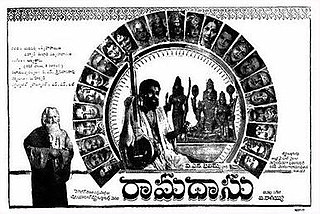
Ramadasu is a 1964 Indian Telugu-language biographical film, based on the life of Kancharla Gopanna, produced and directed by V. Nagayya. It stars Nagayya, with N. T. Rama Rao, Akkineni Nageswara Rao, Sivaji Ganesan and Anjali Devi in special appearances, with music composed by Ashwathama. The blockbuster film has garnered the National Film Award for Best Feature Film in Telugu, and has garnered several state awards.

Nagarjuna is an Indian actor and producer who works in the Telugu cinema. He has acted in over 90 films as a lead actor as well as playing supporting and cameo roles, including Hindi and Tamil cinema. He has received nine state Nandi Awards, three Filmfare Awards South, and one Special Mention at the National Film Awards. The 1996 film Ninne Pelladata which he produced, was declared the Best Telugu film of the year at the National Film Awards.

Iddaru Iddare is a 1990 Telugu-language action drama film, produced by Akkineni Venkat and Yarllagada Surendra under Annapurna Studios and S.S. Creations banner and directed by A. Kodandarami Reddy. It stars Akkineni Nageswara Rao, Nagarjuna and Ramya Krishna, with music composed by Raj–Koti.
Chalaki Mogudu Chadastapu Pellam is a 1989 Telugu-language comedy film, produced by G. Nirmala under the Nirmala Arts banner and directed by Relangi Narasimha Rao. It stars Rajendra Prasad, Rajani and music composed by J. V. Raghavulu. The film was recorded as a Hit at the box office. This movie was remade in Kannada as Golmal Radhakrishna (1990) and was also remade in Tamil as Pondatti Pondattithan (1991).
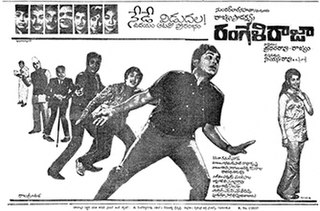
Rangeli Raja is a 1971 Telugu-language, action-drama film, produced by C. Lakshmi Rajyam, C. Sridhar Rao, and Sundarlal Nehata under the Rajyam Productions banner. and directed by C. S. Rao It stars Akkineni Nageswara Rao, Kanchana and music has been composed by Ghantasala.

Manchiki Maro Peru is a 1976 Indian Telugu-language action drama film, produced by M. Manohar under the Sree Ramakrishna Films banner and directed by C. S. Rao. It stars N. T. Rama Rao, Krishnam Raju, Padmapriya and music composed by S. Rajeswara Rao.
Bhadradri may refer to: